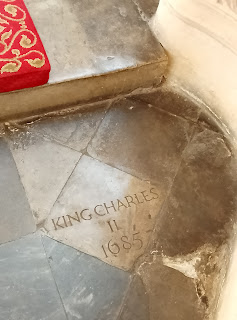We were given free passes through our program to visit Westminster Abbey. Like St. Paul's, we had been there for evensong, but had never toured the church. That changed last Thursday.
Wir haben kostenlose Kirchenpässe im Rahmen unseres Programmes für die Westminster Abtei bekommen. Wir sind schon in dieser Abtei gewesen, aber nur zum Abendgebet. Wir haben die Kirche noch nie erkunden können, aber letzten Donnerstag haben wir sie dann richtig angucken können.
There are so many famous people remembered or buried here: Elgar is not buried here, but Vaughan Williams is.
In dieser Kirche sind so viele berühmte Leute beerdigt oder haben einen Gedenkstein: Elgar hat einen Gedenkstein, aber Vaughan Williams ist hier beerdigt.
Charles Darwin is buried here.
Charles Darwin liegt hier begraben.
Grave of David Livingstone
Grab von David Livingstone
Isaac Newton
High altar
Hochaltar
Grab von Eduard I
You could not access the shrine.
Zum Schrein von Eduard dem Bekenner durfte man nicht gehen.
Grab von Heinrich III
James Watt
Funny!
Lustig!
Grab von Elisabeth I und Maria I
Tombs of Sophia and Mary, daughters of James I and Anne of Denmark
Gräber der Töchter Sophia und Mary von Jakob I und Anna von Dänemark
Lady Chapel
Kapelle Heinrich VII
Grab von Heinrich VII und seiner Frau Elisabeth
Oliver Crowell war hier nur kurz beerdigt.
Grab von Maria Stuart
Wilhelm III von Oranien und seine Frau Maria II
Karl II
Sedilia, 14th century
Sedilien, 14. Jahrhundert
Grab von John Dryden
Eliot and Tennyson: Eliot is not buried here, but Tennyson is.
Eliot ist hier nicht beerdigt, das ist nur ein Gedenkstein, aber Tennyson liegt hier.
Gerard Manley Hopkins and Henry James are also not buried here.
Gerard Manley Hopkins und Henry James haben auch nur Gedenksteine, aber sind hier nicht beerdigt.
Tomb of Chaucer
Grab von Chaucer
Gedenkstein für Cædmon
John Milton
Samuel Johnson
St. Thomas
St. Christopher, late 13th century
Hl. Christophorus, spätes 13. Jahrhundert
Dickens, Kipling, Hardy
Georg Friedrich Händel
Edmund Spenser
The Cloisters: We all thought that this really old part of the abbey and the buildings surrounding them were more interesting than the church itself.
Der Kreuzgang: Wir haben alle gedacht, daß der Kreuzgang und die Gebäude dort interessanter als die Kirche selbst waren.
Cloister Garth
Klostergarten
Kapitelhaus
Supposedly the oldest door in Britain
Angeblich die älteste Tür in Groß-Britannien
Pyx Chamber, 11th century
Pyx Kammer, ca. 1070
Little Cloister
Kleines Kloster
St. Catherine's Chapel and Garden: This garden, just off the Abbey's Little Cloister, is set in the ruins of the 12th-century St Catherine's chapel. Important political and religious gatherings were held in the chapel, and it was here in 1267 that Henry III swore on the Gospels to uphold Magna Carta.
In dieser Katharinenkapelle hat Heinrich III geschworen, die Magna Carta beizubehalten.
Rhubarb
Rhabarber
Hier liegen 20 Mönche, die 1348 and er Pest gestorben sind.
Graves of former abbots
Gräber von früheren Äbten
Coronation chair
Krönungsstuhl






























































































How exciting!! So many tombs! And it's so vast! I love the older sections . . your photos are beautiful. Thanks for sharing! (Were some of the bodies moved to other burial places?)
ReplyDeleteIt is very big! As with St. Paul's, I think they started to put memorials in these churches to stress the importance of certain people even though they were not buried there. Edgar Elgar, for example, was Catholic and of course could not be buried there (and did not want to be buried there). Cromwell was buried there, but Charles II exhumed him and hanged him and put his head on display. But I find it very deceptive to have all those monuments and stones there, but not tell the visitors which are "real" and which are not. You cannot tell by just looking at them.
DeleteYes, I agree it would be better to distinguish which are the true graves. What a morbid story about Cromwell. I didn't know that!
DeleteThey do need better signs in general, especially because they charge so much and treat their churches as museums. Yes, quite awful, but I think English rulers tended to do things like that. It was done to revenge the execution of Charles I.
DeleteI agree with you re the Cloisters they are definitely the most interesting part x
ReplyDeleteI was disappointed that they did not have much information about them on display. I guess we could have bought a book. There is not much left that dates back to the Middle Ages in London and also back to the Catholic church. I thought they could have had more information on what kind of monks lived there and how they lived there, but there was nothing.
Delete